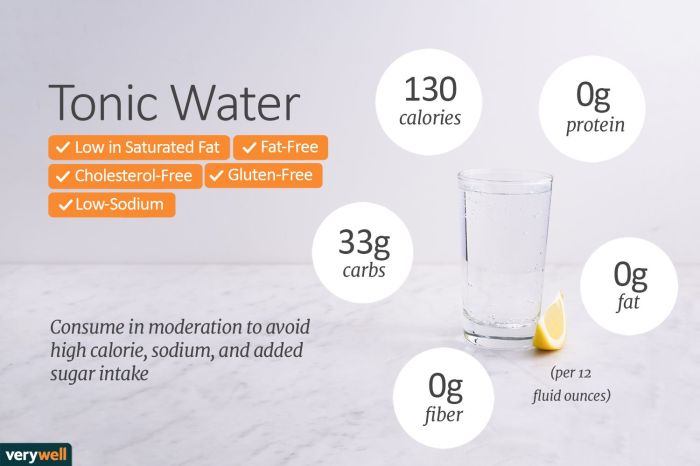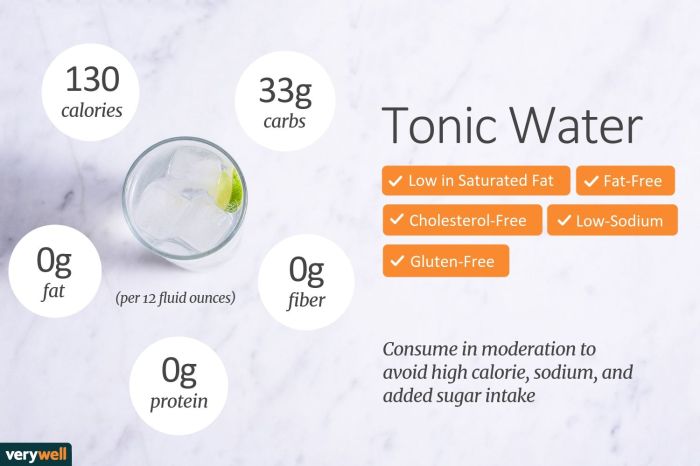Tonic Water in a Balanced Diet: Tonic Water Nutrition Facts

Tonic water nutrition facts – Tonic water, while offering a refreshing taste, requires careful consideration within a balanced diet. Its primary components, carbonated water and quinine, contribute minimally to overall nutritional value, but its sugar content and potential for added calories warrant attention. Understanding its role in hydration and its impact on calorie intake is crucial for its appropriate incorporation into a healthy eating plan.Tonic water’s contribution to hydration is primarily through its water content.
However, its significant sugar content, particularly in commercially available brands, can offset this benefit. Excessive sugar intake is linked to various health concerns, including weight gain and increased risk of chronic diseases. Therefore, mindful consumption is key.
Tonic Water in Various Dietary Plans
The suitability of tonic water in different dietary plans depends heavily on its sugar content and the individual’s overall dietary goals. Considering these factors allows for informed choices about its inclusion or exclusion.
Understanding tonic water nutrition facts often involves comparing it to other beverages. For instance, a contrasting analysis might involve looking at the nutritional profile of something like pulled pork nutrition facts , highlighting the significant differences in caloric content and macronutrient composition. Returning to tonic water, its low calorie count and lack of fat are key nutritional aspects to consider.
- Low-Sugar Diets: Individuals following low-sugar diets should opt for sugar-free or low-sugar tonic water varieties. Careful label reading is essential to verify sugar content and added sweeteners. Even “diet” versions can contain artificial sweeteners that some individuals wish to avoid.
- Weight-Management Diets: Because of its potential caloric contribution from sugar, tonic water should be consumed sparingly in weight-management diets. Substituting it with plain water or unsweetened sparkling water is often a healthier choice. Consider the overall caloric intake from beverages throughout the day.
- Balanced Diets: In a balanced diet, tonic water can be enjoyed occasionally as a treat, but it shouldn’t form a significant part of regular fluid intake. Prioritize water as the primary source of hydration and limit tonic water consumption to special occasions or as a mixer in moderate quantities.
Sample Meal Plan Incorporating Tonic Water Moderately
This sample meal plan illustrates a moderate inclusion of tonic water within a balanced nutritional intake. It emphasizes the importance of prioritizing nutrient-rich foods and limiting added sugars. Note that portion sizes should be adjusted to individual needs and caloric goals.
| Meal | Food Items | Tonic Water Inclusion |
|---|---|---|
| Breakfast | Oatmeal with berries and nuts, a glass of water | None |
| Lunch | Salad with grilled chicken or fish, a small portion of mixed vegetables | None |
| Dinner | Baked salmon with roasted vegetables, a small serving of brown rice | None |
| Evening | A small glass of sugar-free tonic water with a lime wedge | Moderate |
Health Considerations and Potential Risks

While tonic water can be enjoyed as part of a balanced diet in moderation, excessive consumption presents several potential health risks primarily due to its high sugar content and the presence of quinine. Understanding these risks allows for informed and responsible enjoyment of this beverage.Excessive consumption of tonic water, particularly those with high sugar content, can contribute to weight gain, increased risk of type 2 diabetes, and other metabolic disorders.
The high sugar content leads to rapid spikes in blood glucose levels, potentially overwhelming the body’s ability to regulate blood sugar effectively. This is especially concerning for individuals already managing diabetes or exhibiting pre-diabetic symptoms. For example, a single 200ml bottle of tonic water can contain upwards of 20 grams of sugar, which is a significant portion of the recommended daily sugar intake for many adults.
This effect is amplified by frequent consumption.
High Sugar Content and Blood Sugar Levels
The significant sugar content in many tonic water brands poses a considerable risk to individuals with diabetes or those susceptible to developing it. Regular consumption of high-sugar tonic water can lead to consistently elevated blood glucose levels, potentially requiring increased medication dosages for individuals with diabetes or accelerating the onset of the disease in susceptible individuals. Moreover, the high glycemic index of the sugars found in tonic water contributes to rapid blood sugar spikes, making it less desirable than other beverages with lower sugar content and a lower glycemic index.
Managing blood sugar levels effectively requires careful consideration of all dietary choices, including beverages.
Tonic Water and Medication Interactions, Tonic water nutrition facts
Quinine, the compound that gives tonic water its characteristic bitter taste, can interact with certain medications. It’s crucial to consult a healthcare professional if you are taking medications, particularly those affecting the heart, blood thinners, or medications metabolized by the liver. Quinine can potentially affect the effectiveness or increase the side effects of these medications. For instance, concurrent use of quinine and certain antibiotics can lead to increased risk of cardiac arrhythmias.
This interaction highlights the importance of informing your doctor about your tonic water consumption, especially if you are on prescription medication.
Potential Side Effects of High Quinine Consumption
Consuming excessive amounts of quinine can lead to several adverse effects. While the amount of quinine in a typical serving of tonic water is generally considered safe, individuals consuming large quantities, especially through multiple servings daily, may experience the following:
- Tinnitus (ringing in the ears): This is a common side effect of quinine overdose.
- Headaches and dizziness: These symptoms can be indicative of quinine toxicity.
- Visual disturbances: Blurred vision or other visual impairments may occur.
- Gastrointestinal issues: Nausea, vomiting, and diarrhea are possible side effects.
- Allergic reactions: In some individuals, quinine can trigger allergic reactions ranging from mild skin rashes to severe anaphylaxis.
It’s important to note that these side effects are more likely to occur with higher quinine consumption than what is typically found in moderate tonic water intake. However, individuals with pre-existing conditions or sensitivities should exercise caution and limit their consumption.
Clarifying Questions
Is tonic water hydrating?
Yes, like most beverages, tonic water contributes to hydration due to its water content. However, high sugar content in some brands might offset this benefit.
Does tonic water contain caffeine?
No, tonic water does not naturally contain caffeine.
Can tonic water cause digestive issues?
Excessive consumption might cause digestive upset in some individuals due to its high sugar content or quinine sensitivity.
Are there sugar-free options available?
Yes, many brands offer sugar-free or low-sugar versions of tonic water sweetened with artificial sweeteners.
What are the potential long-term effects of consuming high amounts of quinine?
Long-term, high quinine intake can potentially lead to adverse effects, including tinnitus, visual disturbances, and other health complications. It’s crucial to adhere to recommended consumption guidelines.
